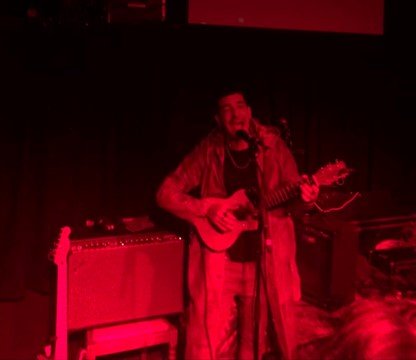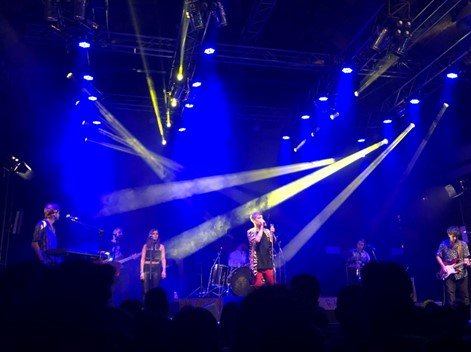Muerdo: Confessions of a Fan-girl
Muerdo in London 20/10/23. Photo credit- Rosie Neaman (author).
It’s 7:49 p.m. on a damp October night in South Tottenham. Unsurprisingly, my friend Gen and I have just ordered drinks. We’re at The Post, a converted Post Office off the Seven Sisters Road that boasts a bar, an Argentine Grill, and a tiny gig space where our idol is about to make his UK debut. We’re a little early, so he’s not there right now — to our astonishment he’s leaning on the bar, less than two feet away from us. Hard to believe, since just four months ago we saw him perform in an overflowing Buenos Aires warehouse, hundreds of fans clamouring to get closer to the man himself. A man who (we swear) flashes us an easy smile as he munches on an empanada.
Meet Pascual Cantero. Or as his half-a-million-strong fan base knows him: Muerdo. This Murcia native released his first album well over a decade ago, having moved to Madrid ‘con una mano adelante y otra atrás’, (with nothing) a carpe diem philosophy that has carried him around the Spanish-speaking world and which also echoes his stage name that literally means ‘I bite’. As he admitted in a breakfast interview on Uruguayan TV, sat in his floor-length red leather jacket, ‘la vida, hay que morderla’ (You’ve got to take a bite out of life).
Over the course of his seven albums, the singer-songwriter has experimented with rich textures that layer a funky hammond organ over tropical electro-beats, or Andean pipes over a gentle Caribbean reggae. Viento sur (2015), Muerdo’s most successful album is a case in point, where hip-hop and rock elements are woven into his folkloric soundscapes. His raw vocals, more and more reminiscent of Andalusian cante jondo take us on a journey from the euphoric, life-affirming highs of ‘No me quieras mal’ and ‘Por tu corriente’ to the haunting ‘Coplas’, a song which Muerdo tends to perform alone, using the microphone not to amplify his already powerful voice, but to mark a heartbeat on his chest as he sings. There is no wonder, then, that his top listeners on Spotify can be found in Santiago, Buenos Aires and Bogotá; his style takes you on a whirlwind journey across the Spanish-speaking world.
I was working in Buenos Aires, when my friend first put me onto his music. Devouring album after album on the Number 15 bus home, I fell in love with his lyrics. His folkloric imaginaries construct a natural paradise out of time, a leap of faith, an endless journey, an unknown path towards freedom. A combative cover of Pablo Milanes’ protest song, ‘Yo pisaré las calles nuevamente’ and extracts from Nicaraguan poet Gioconda Belli’s ‘Claro que no somos una pompa funebre’ lend his songs a revolutionary, but slightly anachronistic feel; he’s not a fan of TikTok and delights in telling the ‘Niña de la ciudad’ (city girl) who thinks she’s so different and unique to free herself from ‘the yoke of manipulation’ and just ‘go for a walk’. Having just uploaded a mirror selfie in The Post’s trendy bathroom to my Instagram, I can’t help but feel slightly attacked.
Clutching our fernet and cokes, Gen and I have now weaved our way to the front (a pretty easy task given the size of the bar). His first appearance in the UK market is on a personal but vulnerable scale. It’s just him, a guitar, and his drummer Diego. As a pared back ‘Claridad’ starts up, there’s an immediate sense of deep, reciprocal appreciation between the artist and his (small) crowd. Right in the middle of it, you’d be fooled into thinking we were 400, not 40. In a recent interview, Muerdo himself acknowledged the devotion of his niche fanbase that ‘nadie sabe existe si no te acercas a verlo’ (Nobody knows it even exists until you get up close and see it for yourself). The hardcore fans even went as far as to hush the rowdy lot at the bar waiting for the main act, Caribefunk, to appear.
On his last Latin American tour ‘Gira y cambia todo’, even the cavernous warehouse in Buenos Aires couldn’t dilute the intimacy of his smaller shows. That gig emanated pure joy from its very core. The impetus of the night, and indeed the ethos at the heart of Muerdo’s creative process is collaboration. Over the course of the set, half a dozen Latin American artists performed with him, some of whom he had met barely a week earlier in Mendoza, the first city on the Argentine leg of his tour. Really, it’s no surprise that Muerdo’s style is so rich. The wandering troubadour is constantly on the road in search of new sounds.
Muerdo in Buenos Aires, 15/2/23. Photo credit- Rosie Neaman, (author).
‘El movimiento es mi inspiración’ he says, ‘es un momento de intimidad’.
Movement is my inspiration. It’s a moment of intimacy.
First on his list in a new city is to get involved with the local music scene and explore new collaborations; these impromptu jamming sessions —on a beach, in a bar, or round someone’s garden table— now dominate his Instagram and Youtube Channel. As he puts it in ‘La canción de la carretera’ (The Highway Song), journeying is ‘lo que prende la mecha para la explosión de cositas buenas’ (it’s what lights his creative fuse.)
And for me, it’s what turns a good gig into a great one. Muerdo is at ease with his crowd, whatever the size. He’s not scared of going off-piste, giving the audience something they’ll have never heard before. In Buenos Aires, that was spontaneous duets; in London, it’s an unreleased love song he’s been writing on the road. After a couple of encores in The Post, Muerdo just wanders into the crowd — there’s no backstage, so he stays to chat with the crowd. Gen and I snatch a brief, nervous conversation with him, and to our hysteric joy he watches the main act with us. In the taxi home, my cheeks hurt from laughing (mainly at my own decidedly uncool behaviour). I am unashamed to admit that for the first time in my life, I am an out-and-out fan-girl.

